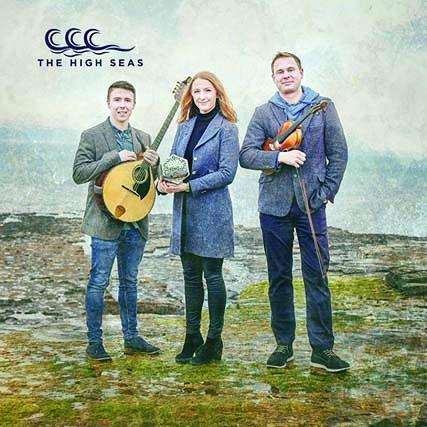September 28, 2018

The High Seas, “The High Seas” • One of the more captivating albums of recent years, not just for its content but also its context: Young performers hitting that sweet spot in presenting Irish music with skill, and respect for the tradition, and showing some imagination in the process. The musicians in question are Caitlín Nic Gabhann (concertina, step dance), her husband Ciarán Ó Maonaigh (fiddle) and Cathal Ó Curráin (vocals, bouzouki, fiddle). Nic Gabhann and Ó Maonaigh released their highly praised debut album in 2015, and have played locally at The Burren Backroom and the “St. Patrick’s Day Celtic Sojourn” event; Ó Curráin, a University of Limerick student, has been a frequent accompanist of theirs. (Astute readers will note their first names all begin with “C,” hence the inspiration for their band name.)
All three have solid roots in the Irish tradition – Nic Gabhann, from Meath, is a three-time All-Ireland champion; Donegal native Ó Maonaigh grew up immersed in that area’s storied fiddle style; Ó Curráin, from the gaeltacht of Donegal’s Gaoth Dobhair, connected to the singing tradition through his aunts – and they demonstrate this to great effect throughout the album. It’s nigh impossible, for instance, not to relish Nic Gabhann’s snap and drive on reels, like in the “Tomás Clancy’s No. 2” and “Drunken Landlady” medleys. Ó Maonaigh’s classic Donegal treatment of the strathspey “Stirling Castle” – followed by equally crisp renditions of “The Lowlands of Scotland” and “Mooney’s Reel” – is similarly joyful, as is Ó Curráin’s bouzouki backing, which ranges seamlessly between straight chordal and more nuanced rhythm. And then there’s Ó Curráin’s singing – relaxed, tender and well-phrased, most of it in Gaelic. Of special note is “Níl Cailín Óg Níos Deise,” a family heirloom of sorts: The words are from a song written for his grandmother by a long-ago lover; the lyrics were found after her death in a box filled with letters under her bed.
All pleasing enough, to be sure, but then there are those bits of inspiration and inventiveness that make a good album even better. Some are subtle and understated, like Ó Curráin’s double-tracked vocals on “The Road to Donegal”; Ó Maonaigh’s cello-like accompaniment of Ó Curráin on “Máire Ní Eidhin” (another song with ties to Ó Curráin’s family); or the little prelude Nic Gabhann, Ó Maonaigh and Ó Curráin (playing fiddle) tack onto the start of Nic Gabhann’s composition “Éigse an Spidéil,” which transitions into the venerable reel, “Come West Along the Road” that includes stepping from Nic Gabhann (who, it bears mentioning, appeared in “Riverdance” at one time). Their creativity is arguably at its peak on the track that begins with Ó Curráin singing “Mo Ghloine Uisce Beatha” - a composition by his grandfather with one of those melodies that sounds delightfully full of brass and bravado - and segues into a Swedish traditional tune, “Edklunda Polska,” with Nic Gabhann’s foot percussion lending a sort of Quebecois feel to the proceedings. One of the most delicately sublime tracks is “The Speaking Waltz” (also known in Donegal tradition as “The Exhibition Waltz”), with Ó Maonaigh playing the melody to an intricate but unobtrusive counter-melody by Ó Curráin, while Nic Gabhann chimes in with a series of held notes high up in the register, her concertina sounding more like a little table organ.
That kind of judiciously employed creativity – going just a little beyond the familiar here, taking a less-is-more approach there – helps to energize the tradition, and The High Seas have gallons of it. [caitlin.ie/the-high-seas]
House of Hamill, “March Through Storms” • The duo of Rose Baldino and Brian Buchanan has quite the pedigree, being former members of two high-profile folk-Celtic-rock bands: Baldino of the now-defunct Burning Bridget Cleary, Buchanan of Enter the Haggis. And the name they go by has an impressive bloodline, too: It’s the title of a tune composed by the great fiddler Ed Reavy (Philadelphia by way of Co. Cavan), a relentless reel with a third part a musician once described, somewhat jokingly, as “pure, twisted evil.” Besides being experienced in trad-style fiddling, Baldino and Buchanan also have backgrounds in classical violin to go with the various rock/pop influences they’ve picked up over the years.
“March Through Storms,” their first release, is heavy on that aforementioned rock/pop dimension. Buchanan’s electric guitar and keyboards, along with Chico Huff’s bass guitar and Bruce McCarthy’s drums, are as much a presence as his and Baldino’s fiddles (he also plays acoustic guitar, banjo and mandolin; she, guitar and banjo), and there are plenty of rock hooks, licks, and stylings. This makes for some viscerally exciting moments, most often when Baldino and Buchanan trade off or duet on the three instrumental medleys, “Cedars House,” “Delay Set” and “Rainy Day Set,” all of which are originals.
Similarly, it is their combined vocals that are the strongest feature of the album’s songs, like “Advancing Army,” the allegorical “Snake Oil,” and the mellow but vivid “You Are My Home”; elsewhere, Baldino has a good time leading their cover of the 1976 Heart classic “Magic Man,” in which they interpolate their namesake tune, while Buchanan does a fine job on Ed Pickford’s rousing labor ballad, “Pound a Week Rise.”
Not everything works – “Pandora’s Box” comes off lyrically listless, and seems like it belongs on a different album – but the overall energy level, craft, and theatricality in Baldino and Buchanan’s music make it easy to appreciate. Their house is clearly in order. [houseofhamill.com]

